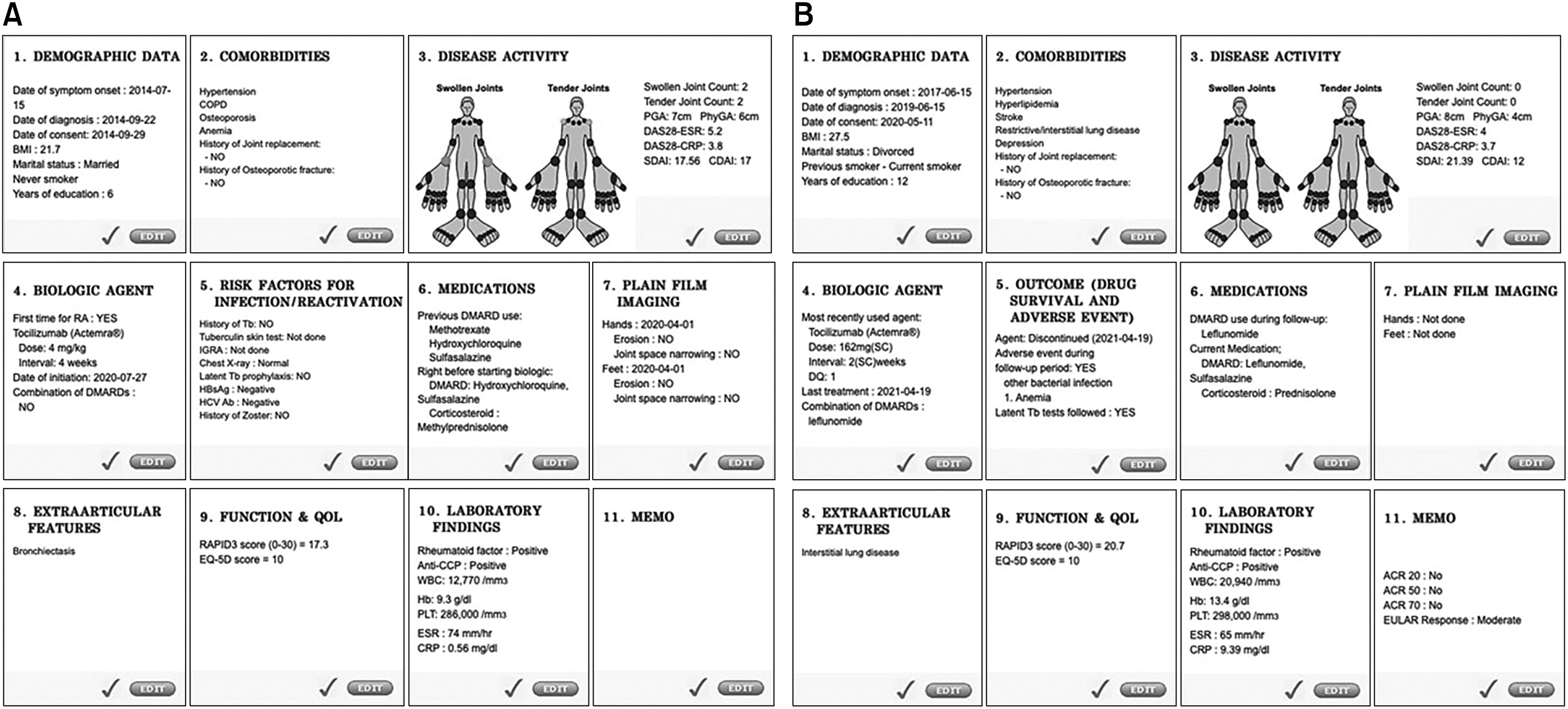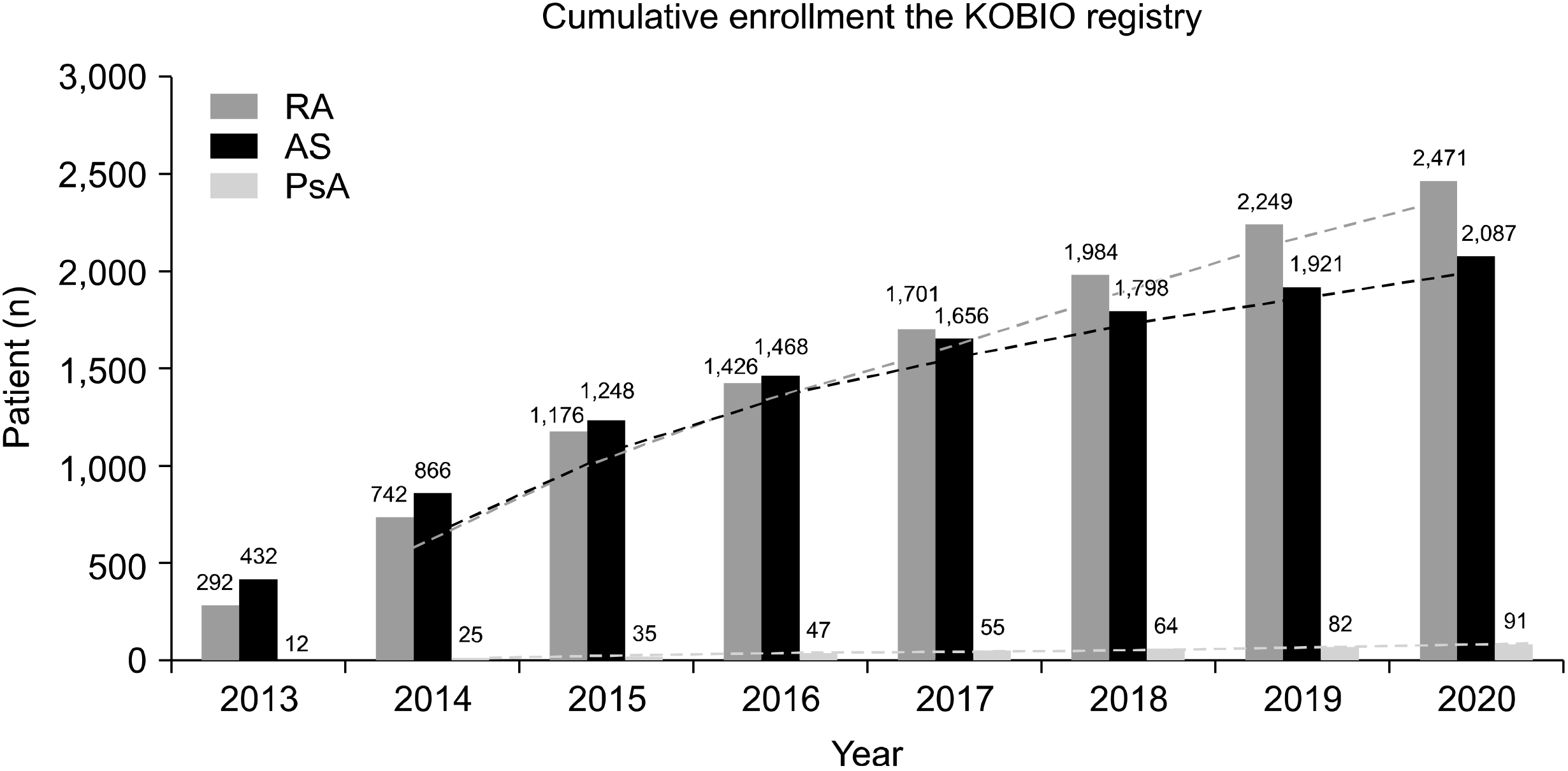1. Baumfeld Andre E, Reynolds R, Caubel P, Azoulay L, Dreyer NA. 2020; Trial designs using real-world data: the changing landscape of the regulatory approval process. Pharmacoepidemiol Drug Saf. 29:1201–12. DOI:
10.1002/pds.4932. PMID:
31823482. PMCID:
PMC7687110.

2. Sherman RE, Anderson SA, Dal Pan GJ, Gray GW, Gross T, Hunter NL, et al. 2016; Real-world evidence - what is it and what can it tell us? N Engl J Med. 375:2293–7. DOI:
10.1056/NEJMsb1609216. PMID:
27959688.

3. Booth CM, Tannock IF. 2014; Randomised controlled trials and population-based observational research: partners in the evolution of medical evidence. Br J Cancer. 110:551–5. DOI:
10.1038/bjc.2013.725. PMID:
24495873. PMCID:
PMC3915111.

4. Gliklich RE, Dreyer NA, Leavy MB. Gliklich RE, Dreyer NA, Leavy MB, editors. 2014. Patient registries. Registries for evaluating patient outcomes: a user's guide. 3rd ed. Agency for Healthcare Research and Quality (US);Rockville (MD):
5. Nikiphorou E, Buch MH, Hyrich KL. 2017; Biologics registers in RA: methodological aspects, current role and future applications. Nat Rev Rheumatol. 13:503–10. DOI:
10.1038/nrrheum.2017.81. PMID:
28569267.

6. Mercer LK, Regierer AC, Mariette X, Dixon WG, Baecklund E, Hellgren K, et al. 2017; Spectrum of lymphomas across different drug treatment groups in rheumatoid arthritis: a European registries collaborative project. Ann Rheum Dis. 76:2025–30. DOI:
10.1136/annrheumdis-2017-211623. PMID:
28822981. PMCID:
PMC5705847.

7. Mercer LK, Askling J, Raaschou P, Dixon WG, Dreyer L, Hetland ML, et al. 2017; Risk of invasive melanoma in patients with rheumatoid arthritis treated with biologics: results from a collaborative project of 11 European biologic registers. Ann Rheum Dis. 76:386–91. DOI:
10.1136/annrheumdis-2016-209285. PMID:
27307502. PMCID:
PMC5284347.

8. Askling J, Fored CM, Brandt L, Baecklund E, Bertilsson L, Feltelius N, et al. 2007; Time-dependent increase in risk of hospitalisation with infection among Swedish RA patients treated with TNF antagonists. Ann Rheum Dis. 66:1339–44. DOI:
10.1136/ard.2006.062760. PMID:
17261532. PMCID:
PMC1994293.

9. Hetland ML, Christensen IJ, Tarp U, Dreyer L, Hansen A, Hansen IT, et al. 2010; Direct comparison of treatment responses, remission rates, and drug adherence in patients with rheumatoid arthritis treated with adalimumab, etanercept, or infliximab: results from eight years of surveillance of clinical practice in the nationwide Danish DANBIO registry. Arthritis Rheum. 62:22–32. DOI:
10.1002/art.27227. PMID:
20039405.

10. Iannone F, Gremese E, Atzeni F, Biasi D, Botsios C, Cipriani P, et al. 2012; Longterm retention of tumor necrosis factor-α inhibitor therapy in a large Italian cohort of patients with rheumatoid arthritis from the GISEA registry: an appraisal of predictors. J Rheumatol. 39:1179–84. DOI:
10.3899/jrheum.111125. PMID:
22467933.

12. MedDRA. Medical Dictionary for Regulatory Activities [Internet]. MedDRA;McLean (VA): Available from:
http://www.meddra.org/. cited 2021 Mar.
15. Zavada J, Dixon WG, Askling J. 2014; Launch of a checklist for reporting longitudinal observational drug studies in rheumatology: a EULAR extension of STROBE guidelines based on experience from biologics registries. Ann Rheum Dis. 73:628. DOI:
10.1136/annrheumdis-2013-204102. PMID:
24058015.

16. Zink A, Askling J, Dixon WG, Klareskog L, Silman AJ, Symmons DP. 2009; European biologicals registers: methodology, selected results and perspectives. Ann Rheum Dis. 68:1240–6. DOI:
10.1136/ard.2008.091926. PMID:
18647854.

17. Canhão H, Faustino A, Martins F, Fonseca JE. 2011; Reuma.pt - the rheumatic diseases Portuguese register. Acta Reumatol Port. 36:45–56. PMID:
21483280.
18. Carmona L, de la Vega M, Ranza R, Casado G, Titton DC, Descalzo MÁ, et al. 2014; BIOBADASER, BIOBADAMERICA, and BIOBADADERM: safety registers sharing commonalities across diseases and countries. Clin Exp Rheumatol. 32(5 Suppl 85):S-163-7. PMID:
25365109.
19. Kvien TK, Heiberg , Lie E, Kaufmann C, Mikkelsen K, Nordvåg BY, et al. 2005; A Norwegian DMARD register: prescriptions of DMARDs and biological agents to patients with inflammatory rheumatic diseases. Clin Exp Rheumatol. 23(5 Suppl 39):S188–94. PMID:
16273806.
21. Zink A, Listing J, Kary S, Ramlau P, Stoyanova-Scholz M, Babinsky K, et al. 2005; Treatment continuation in patients receiving biological agents or conventional DMARD therapy. Ann Rheum Dis. 64:1274–9. DOI:
10.1136/ard.2004.031476. PMID:
15708884. PMCID:
PMC1755655.

22. Hetland ML, Unkerskov J, Ravn T, Friis M, Tarp U, Andersen LS, et al. 2005; Routine database registration of biological therapy increases the reporting of adverse events twentyfold in clinical practice. First results from the Danish Database (DANBIO). Scand J Rheumatol. 34:40–4. DOI:
10.1080/03009740510017968. PMID:
15903024.

24. Kim SK, Choe JY, Lee SS, Shin K. 2017; Body mass index is related with the presence of syndesmophyte in axial spondyloarthritis: data from the Korean College of Rheumatology BIOlogics (KOBIO) registry. Mod Rheumatol. 27:855–61. DOI:
10.1080/14397595.2016.1265637. PMID:
27919202.

25. Kim SK, Kwak SG, Choe JY. 2020; Association between biologic disease modifying anti-rheumatic drugs and incident hypertension in patients with rheumatoid arthritis: results from prospective nationwide KOBIO Registry. Medicine (Baltimore). 99:e19415. DOI:
10.1097/MD.0000000000019415. PMID:
32118795. PMCID:
PMC7478791.
26. Kim SK, Choe JY, Kwak SG, Bae J, Park SH, Lee H. 2018; Effect of tumour necrosis factor-alpha inhibitors on renal function in patients with rheumatoid arthritis from the KOBIO registry from 2012 to 2016. Clin Exp Rheumatol. 36:1022–30. PMID:
29652655.
27. Min HK, Kim HR, Lee SH, Shin K, Kim HA, Park SH, et al. 2021; Four-year follow-up of atherogenicity in rheumatoid arthritis patients: from the nationwide Korean College of Rheumatology Biologics Registry. Clin Rheumatol. 40:3105–13. DOI:
10.1007/s10067-021-05613-x. PMID:
33576925.

28. Kim Y, Park S, Kim HS. 2018; The effect of extra-articular manifestations on tumor necrosis factor-α inhibitor treatment duration in patients with ankylosing spondylitis: nationwide data from the Korean College of Rheumatology BIOlogics (KOBIO) registry. Clin Rheumatol. 37:3275–84. DOI:
10.1007/s10067-018-4290-0. PMID:
30251059.

29. Park DJ, Choi SJ, Shin K, Kim HA, Park YB, Kang SW, et al. 2017; Switching profiles in a population-based cohort of rheumatoid arthritis receiving biologic therapy: results from the KOBIO registry. Clin Rheumatol. 36:1013–22. DOI:
10.1007/s10067-017-3584-y. PMID:
28243760.

30. Ki Min H, Kim HR, Lee SH, Hong YS, Kim MY, Park SH, et al. 2021; Mar. 16. Retention rate and effectiveness of secukinumab vs TNF inhibitor in ankylosing spondylitis patients with prior TNF inhibitor exposure. Rheumatology (Oxford). [Epub]. DOI:10.1093/rheumatology/keab245. DOI:
10.1093/rheumatology/keab245. PMID:
33725088.

31. Jung SM, Lee SW, Song JJ, Park SH, Park YB. 2020; Dec. 14. Drug survival of biologic therapy in elderly patients with rheumatoid arthritis compared with nonelderly patients: results from the Korean College of Rheumatology Biologics registry. J Clin Rheumatol. [Epub]. DOI:10.1097/RHU.0000 000000001644. DOI:
10.1097/RHU.0000000000001644. PMID:
33337811.
32. Jung SM, Kwok SK, Ju JH, Lee SW, Song JJ, Yoon CH, et al. 2018; Risk factors associated with inadequate control of disease activity in elderly patients with rheumatoid arthritis: results from a nationwide KOrean College of Rheumatology BIOlogics (KOBIO) registry. PLoS One. 13:e0205651. DOI:
10.1371/journal.pone.0205651. PMID:
30325962. PMCID:
PMC6191131.

33. Koh JH, Lee SK, Kim J, Kim HA, Shin K, Min JK. 2021; Effectiveness and safety of biologic and targeted synthetic disease-modifying anti-rheumatic drugs in elderly patients with rheumatoid arthritis: real-world data from the KOBIO Registry. Clin Exp Rheumatol. 39:269–78. PMID:
32324126.
34. Kim HA, Lee E, Lee SK, Park YB, Lee YN, Kang HJ, et al. 2020; Retention rate and safety of biosimilar CT-P13 in rheumatoid arthritis: data from the Korean College of Rheumatology Biologics registry. BioDrugs. 34:89–98. DOI:
10.1007/s40259-019-00393-y. PMID:
31734899. PMCID:
PMC6985057.

35. Kim HA, Lee E, Lee SK, Park YB, Lee YN, Kang HJ, et al. 2020; Retention rate and long-term safety of biosimilar CT-P13 in patients with ankylosing spondylitis: data from the Korean College of Rheumatology Biologics registry. Clin Exp Rheumatol. 38:267–74. PMID:
31365335.
36. Kim HA, Lee E, Lee SK, Park YB, Shin K. 2020; Retention rate and efficacy of the biosimilar CT-P13 versus reference infliximab in patients with ankylosing spondylitis: a propensity score-matched analysis from the Korean College of Rheumatology Biologics Registry. BioDrugs. 34:529–39. DOI:
10.1007/s40259-020-00432-z. PMID:
32696266. PMCID:
PMC7391390.

37. Hetland ML. 2005; DANBIO: a nationwide registry of biological therapies in Denmark. Clin Exp Rheumatol. 23(5 Suppl 39):S205–7. PMID:
16273809.





 PDF
PDF Citation
Citation Print
Print





 XML Download
XML Download